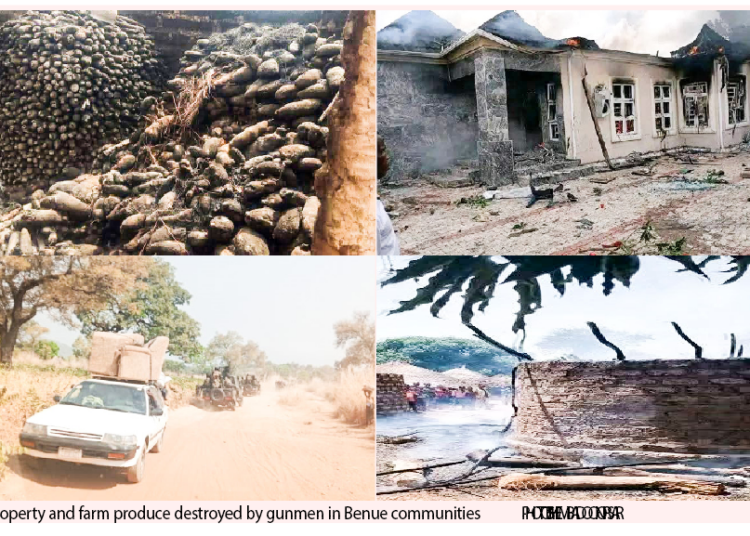Once again, Benue State has been plunged into mourning. In what can only be described as a coordinated onslaught on defenceless communities, gunmen widely believed to be armed herders launched fresh attacks on Yelewata and Daudu communities in Guma Local Government Area (LGA), leaving more than 100 people feared dead, with dozens more injured, displaced, or missing.
Forty-eight hours earlier, 25 people had been killed in two other communities in Makurdi LGA. From all available accounts, these were not random acts of violence; they were cold-blooded, calculated massacres executed with impunity.
This latest wave of killings paints a grim picture of a state under siege, of a people repeatedly failed by those charged with their protection. Homes were burnt. Entire families – some numbering up to 15 -were burnt alive in their sleep. Survivors spoke of terrorists pouring petrol on market stalls turned shelters for Internally Displaced Persons (IDPs) and setting them ablaze. Youths and local security personnel who tried to resist the attackers were outnumbered and overwhelmed. Even security forces deployed to respond lost some of their own in the line of duty.
Benue State, it appears, been turned into a killing field with grim regularity. This year, from the Logo and Ukum attacks in April which left over 50 dead, to the most recent tragedy in Guma, the frequency of these atrocities is as alarming as the scale of destruction.
What is perhaps most damning is that these attacks did not come without warning. Community leaders had reportedly raised the alarm days before the violence, alerting authorities to the presence of armed groups amassing near vulnerable towns. Yet the warnings went unheeded, and tragedy followed. If communities must live in fear even after sounding the alarm, then what is left of state protection?
The reactions that followed, while necessary, also ring hollow in the face of repeated bloodshed. President Bola Tinubu directed security chiefs to implement his earlier directive to bring lasting peace and security to Benue State. Describing the killings and bloodletting as inhuman and anti-progress, President Tinubu called on political leaders and community leaders in conflict areas to stop fuelling the crisis through unguarded utterances and statements that could further inflame tensions.
On his part, Pope Leo XIV condemned the killings in Benue State, describing the incident as a “terrible massacre.
Benue State Governor Hyacinth Alia, in his reaction, has called for greater support from the federal government, stating that Benue needs not a state of emergency but “emergency help” in the form of armoured vehicles, personnel, and political will to root out the invaders.
But these statements, however well-intentioned, are beginning to feel like echoes in a hollow chamber. The people of Benue do not need more condolences. They need security. They need to return to their farms. They need to sleep at night without fear of being slaughtered. They need justice.
At the centre of the blame game now unfolding are accusations and counter-accusations between state actors. Governor Alia has alleged that some top politicians based in Abuja, including members of the National Assembly, are sponsoring or harbouring those perpetrating the attacks. The Benue National Assembly Caucus, in turn, has dismissed his claims as baseless and irresponsible, pointing instead to the governor’s alleged refusal to implement the state’s Open Grazing Prohibition Law or acknowledge the severity of the killings in public forums.
This political mudslinging, while dramatic, is dangerously distracting. What the people of Benue need is not a war of words between politicians. They need coordination, a unified front, and action.
At the heart of this crisis is the failure of the Nigerian state to enforce one of its most basic obligations: the protection of life and property. The perpetrators of these heinous attacks must not only be arrested but also prosecuted to the full extent of the law. Anything short of that emboldens others and sends a dangerous message – that in Nigeria one can spill blood and walk free.
The federal government must also take immediate and visible steps to assist the Benue State government in dislodging the invaders, securing displaced communities, and rebuilding destroyed homes. Security architecture in Benue – and indeed across Nigeria’s middle belt – must be restructured to reflect the realities of asymmetric warfare, with better intelligence gathering, rapid response capability, and community engagement.
The political leadership must equally revisit the broader issue of land use, grazing routes, and farmer-herder relations. It is no longer tenable to pretend that these are isolated cases or mere “clashes.” The scale, coordination, and brutality of the attacks suggest an agenda far more sinister than what is often portrayed.
The federal government, for its part, must initiate a national dialogue around the matter and, if necessary, harmonise laws that preserve communal rights to land while addressing the concerns of nomadic populations in a manner that ensures peace, not bloodshed.
As a newspaper, we join the people of Benue in mourning and call for immediate action, not speeches. The time has come to break the cycle of violence and impunity. Nigeria cannot afford to normalise mass killings, and no state should be allowed to bleed endlessly while the rest of the country looks away.
It is time to end the bloodletting in Benue. The federal and state governments must commit all resources necessary to achieve peace and stability in the state. The time is now.





